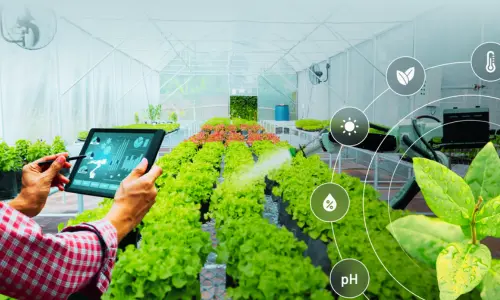MULTAN, Mar 24 (APP): Agriculture stands tall as the cornerstone of Pakistan’s economy, with millions of families directly or indirectly relying on this vital sector for their livelihoods.
However, a significant portion of farmers are still facing limited access to modern agricultural tools, which are indispensable for achieving bumper crop yields. From soil analysis to post-harvesting techniques, the tools play a pivotal role in every phase of agricultural production.
At the heart of agricultural success lies the soil. Understanding its composition and health is paramount for farmers who wish to maximize their yields. Modern soil analysis tools empower farmers to assess nutrient levels, pH balance, and potential contaminants, thus allowing for precise and targeted interventions, said Dr Alamgir Khan, Coordinator Faculty of Biosystem, Engineering and Technology, Muhammad Nawaz Sharif University of Agriculture.
He said, “With this knowledge, farmers can effectively manage the fertilization and irrigation practices for crops’ growth”. Mechanized plows, seed drills, and cultivators streamline the process with minimum time and effort, Dr Khan stated.
From precision irrigation systems to crop monitoring drones, modern technologies benefit farmers in managing their fields with precision and foresight. Real-time data on moisture levels, pest infestations, and crop health enable proactive decision-making, mitigating risks and optimizing resource allocation, said Khan. “One key aspect is the deficiency of organic matter within Pakistani soil, standing at a mere 0.5 percent compared to over 6.5 percent in high-yield countries”, he added.
Dr. Khan also pointed out the lack of designated traffic zones for heavy machinery in Pakistani fields, leading to soil compaction and structural damage that hinders crop growth. The developed countries have special traffic zones for movement of tractors and other heavy machinery on the soil, he informed. He also underscored the significance of proper plowing techniques, concerning the prevalent practice of crop residue burning, which kills beneficial microorganisms.
Dr. Khan advocated for the adoption of modern plowing tools, citing innovations like the windrow turner developed by Muhammad Nawaz Sharif University of Agriculture Multan (MNSUAM), which facilitates composting on a large scale, converting farm waste into valuable resources.
Investment in the compost market, Dr. Khan suggested, could be lucrative, with the global market potentially reaching five to seven billion dollars. He also stressed the importance of soil moisture retention and advocated for the use of rippers to break hardpan soil layers as it enabled better water absorption.
The agriculture scientist also reported a global decline in phosphorus reservoirs and also attributed it to the increasing prices of DAP fertilizers. He proposed utilizing animal manure as a phosphorus source through modern agricultural machinery.
However, acknowledging the significance of sprinkler and drip irrigation systems, Dr. Khan maintained that healthy soil preparation according to modern standards not only conserves water but also contributes to bumper crop yield. He also highlighted the potential of drone sprayers and modern fertilizer application techniques in resource conservation which ultimately led to profit generating farming.
Similarly, he stated, “the post-harvesting tools play a crucial role in preserving the quality and quantity of agricultural produce. Efficient harvesting machinery reduces losses and ensures timely collection while minimizing waste and multiplying the profits.
Similarly, the modern storage facilities equipped with temperature and humidity control mechanisms prolong the shelf life of perishable crops and facilitate market access, he remarked. To a query, he stated that the world was moving towards nano-technology, nano-fertilizers and some other modern practices to achieve goals of food security.
Secretary Agriculture South Punjab Saqib Ateel stated “Although agriculture tools are very important but we cannot term all tools as essential for bumper produce. He added that sometimes heavy machinery conveyed loss.
“We need to promote such modern tools which work with precision and offer more profit”, Saqib maintained. Efficient machines at all stages of crop growth, right from soil preparation to post harvest management, must be utilized amicably.
In traditional farming practices, farmers waste 70 percent of pesticides, and fertilizers, however, they could avoid by utilizing modern spray tools. Now, drones are the latest tools for spray.
These contain sensors and manage spray at affected areas only, said Saqib. Similarly, there emerged some more latest but efficient tools which harvest only the ripe fruits, etc. Apart from this, there were some machines also available for accurate and precise use of fertilizers.
When fertilizers used traditionally, about 70 percent could not yield the required results. However, the latest machines are the solution to our different agricultural problems.
Saqib Ateel also suggested prioritizing investment in these transformative technologies for sustainable agriculture.
Shahid Hameed Bhutta, the known mango grower, also shared his experiences and stated that machinery was essential for smart agriculture practices and gaining more production.
Similarly, there is a dearth of labor in the agriculture field.
The role of machinery cannot be denied, he said, adding that a huge portion of peasants lacked access to machinery due to limited sources. He stated that the government should come forward and provide machinery to small farmers through reverse engineering.
Agriculture department officials Abdul Samad and Rrashid Sidhu, while commenting on farm mechanization, stated that the Punjab government was offering subsidies on 56 agri-tools of different nature to facilitate the farming community.
APP/atf-xl/taj (APP Feature Service)







